- Home
- Ellen Datlow
The Dark Page 2
The Dark Read online
Page 2
Almost daily, I heard reports from other guys who had seen it floating just below the surface only twenty yards or so from where they were clamming. They’d weigh anchor and start their engines, but by the time they maneuvered their boats to where they had seen it, it would be gone. Every time it was spotted, some mishap would follow—a lost rake head, a cracked transom, the twin-hole vampire bite from an eel. The kid was soon understood to be cursed. One night, after Pat Ryan got finished relating his own run-in with the errant corpse, Downsy, who was well drunk by then, swore that when he was passing the center of the bridge two days earlier, he’d seen the pale, decomposing figure of the kid swim under his boat.
“Get the fuck outa here,” somebody said to him and we laughed.
He didn’t laugh. “It was doing the god-damn breast stroke, I swear,” he said. “It was swimming like you swim in good dreams, like flying underwater.”
“Did you end up boffing it on Grass Island?” somebody asked.
Downsy was dead serious, though, and to prove it, took a swing at the joker, inciting a brawl that resulted in Earl banning him from the Kettle for a week.
I asked John Hunter the next day, as our boats bobbed side by side off the eastern edge of Grass Island, if it was possible the kid’s body could still be around.
“Sure,” he said, “anything’s possible, except maybe you raking more neck than me in a day. My guess is that you wouldn’t want to find it at this point—all bloated and half-eaten by eels and bottom feeders. Forget the eyes, the ears, the lips, the belly meat. The hair will still be there, though, and nothing’s gonna eat the teeth.”
“Could it be cursed?” I asked him.
He laughed. “You have to understand something,” he said. “If I was talking to you on dry land, I’d think you were nuts, but this is the bay. The ocean, the bay, the waters of the world are God’s imagination. I’ve known wilder things than that to be true out here.”
The image of what was left of the kid when John Hunter finished his forensic menu haunted me. At night, while I was trying to read, it floated there in my thoughts, obscuring whatever story I was in the middle of. Then the words of the rosary threaded their way up from downstairs to weave an invisible web around it, fixing it fast, so that the current of forgetting couldn’t whisk it away. One hot midnight at the end of June, I couldn’t take thinking about it anymore, so I slipped on my sneakers and went out walking. I headed away from The Copper Kettle, to the quiet side of town. I’d been burnt badly by the sun that day and the breeze against my skin made me shiver. For an hour or more I wandered aimlessly until I finally took a seat on a park bench next to the basketball court.
I realized it was not chance that had brought me to that spot. They say that when you drown, your life passes before your eyes in quick cuts like a television commercial. I wondered if in that blur of events, the kid had noticed me passing him the ball, getting the older guys to let him play in a game, showing him how to shoot from the foul line. What before had been a vague memory now came back to me in vivid detail. I concentrated hard on my recollection of him in life, and this image slowly replaced the one of him drowned and ravaged by the bay.
He was a skinny kid, not too tall, not too short, with brown silky hair in a bowl cut. When I knew him, he was about ten or eleven, but he had long arms, good for stopping passes and stealing the ball. He was quick and unafraid of the older guys who were much bigger than him. What I saw most clearly were his eyes, big round ones, the color green of bottle glass tumbled smooth by the surf, that showed his disappointment at missing a shot or the thrill of playing in a game with high-school-aged guys. He was quiet and polite, not a show-off by any means, and I could tell he was really listening when I taught him how to put back-spin on the ball. Finding him in my thoughts was not so very hard. What was nearly impossible was conceiving of him lifeless—no more, a blank spot in the world. I thought about all the things he would miss out on, all the things I had done between his age and mine. Later that night, after I had made my way home and gone to sleep, I dreamt I was on the basketball court with him. He was shooting foul shots, and I stepped up close and leaned over. “Remember, you must never panic,” I said.
Come July, the bottom fell out of the market, and prices paid for counts went way down due to the abundance of that summer’s harvest. Not even John Hunter could predict the market, and so although we’d all made a killing in May and June, we were now going to have to pay for it for the rest of the season. We’d all gone a little crazy with our money at the bar, not thinking ahead to the winter and those days it would be impossible to work.
I started staying out on the water longer, only getting back to the dock when the sun was nothing more than a red smudge on the horizon. Some of the buyers would be gone by then, but a couple of them stayed around and waited for us all to get in. I also started playing it a little fast and loose with the weather, going out on days that were blustery and the water was choppy. In May and June I’d have written them off and gone back to bed or read a book, but I wanted to hold on to what I had saved through the flush, early part of the season.
One afternoon, in the last week in July, while over in the flats due south of Babylon, I had stumbled upon a vein of neck, a bed like you wouldn’t believe. I was bringing up loaded rake heads every fifteen minutes or so. After two straight hours of scratching away, the clams were still abundant. Around three o’clock, in the midst of my labor, I felt the wind rise, but paid it no mind since it invariably came on in the late afternoon. Only when I had to stop to rest my arms and catch my breath an hour later did I notice that the boat was really rocking. By my best estimation, I’d taken enough for two count bags of little-neck and a bag of top-neck. While I rested, I decided to cull some of my take and get rid of the useless seed clams and the chowders. That’s when I happened to look over my shoulder and notice that the sun was gone and the water had grown very choppy.
I stood up quickly and turned to look back across the bay only to see whitecaps forming on the swells and that the color of the water was darkening toward that iron gray. In the distance, I could see clam boats heading back in toward the docks.
“Shit,” I said, not wanting to leave the treasure trove that still lay beneath me, but just then a wave came along and smacked the side of the boat, sending me onto my ass between the seat slats and into the bilge. That was all the warning I needed. I brought in my rake, telescoped the handle down, and stowed the head. When I looked up this time, things had gotten a lot worse. The swells had already doubled in size, and the wind had become audible in its ferocity. By the time I dragged in the anchor, the boat was lurching wildly. The jostling I took made it hard for me to maneuver. I had to be careful not to get knocked overboard.
“Come on, baby,” I said after pumping the engine. I pulled on the cord only once and it fired up and started running. I swung the handle to turn the boat around in order to head back across the bay to the dock. Off to my left, I noticed a decked-over boat with a small, red cabin, and knew it was Downsy. He was heading in the wrong direction. I followed his path with my sight and for the first time laid eyes on a guy who was scratch-raking about a hundred yards to my left. He was in up to his chest and although he could stand, the walk back to the shallows by the bridge was a good four hundred yards. He’d never make it. Without thinking, I turned in that direction to see if I could help.
As I chugged up close, I saw Downsy move quickly back into his cabin from where he had been leaning over the clammer on the side of the boat. His engine roared, and he turned the boat around and left the guy standing there in the water. His boat almost hit the front of mine as he took off. I called to him, but he never looked back. I pulled my boat up alongside the guy in the water and was about to yell, “How about a lift,” when I saw why Downsy had split.
Bobbing in that iron-gray water, trying to keep his head above the swells, was the Trentino kid. He wasn’t the decomposed horror show that John Hunter had described, but his skin was mottled
a very pale white and bruise green. Around the lower portion of his throat he had that drowned man’s blue necklace. His hair was plastered to his head by the water, and those big green eyes peered up at me, his gaze literally digging into mine. That look said, “Help me,” as clearly as if he had spoken the words. He was shivering like mad, and he held his arms up, hands open, like a baby wanting to be carried.
I sat there in the wildly rocking boat, staring in disbelief, my heart racing. What good it was going to do me against the dead, I didn’t know, but I drew my knife, a ten-inch serrated blade and just held it out in front of me. My other hand was on the throttle of the engine, keeping it at an idle. I wanted to open the engine up all the way and escape as fast as possible, but I was paralyzed somewhere between pity and fear. Then a big wave came swamping the kid and slamming the side of my boat. The whole craft almost rolled over, and the peak of the curl slapped me in the face with ice-cold water.
The dead kid came up spluttering, silently coughing water out of his mouth and nose. His eyes were brimming with terror.
“What the hell are you?” I yelled.
His arms, his fingers, reached for me more urgently.
“Deaths,” the old-timers had said, as in the plural, and this thought wriggled through my frantic mind like an eel, followed by my realization that what Downsy had been fleeing was the “curse.” I took another wave in the side and the boat tipped perilously, the water drenching me. Clams scattered across the deck as the baskets slid, and my cull box flew over the side. I felt, in my confusion and fright, a brief stab of regret at losing it. I looked back to the kid and could see that he seemed anchored in place, his foot no doubt in a sinkhole. Another minute and he would be out of sight beneath the surface. I thought I’d be released from my paralysis once his eyes were covered by the gray water. I dropped my knife and almost thrust my hand out to grab his, but the thought of taking Death into my boat stopped me in mid-reach.
I had to leave or I’d be swamped and sunk just lolling there in the swells. “No way,” I said aloud, with every intention of opening the throttle, but just then the kid made one wild lunge, and the tips of the green-tinged fingers of his left hand landed on the side of the boat. I remembered John Hunter telling me it was the rule of the bay to help when you could. The boat got slammed, and I saw the kid’s hand begin to slip off the gunwale. I couldn’t let him die again, so I reached out. It was like grabbing a handful of snow, freezing cold and soft, and a chill shot up through my arm to my head and formed a vision of the moment of his true death. I felt his panic, heard his underwater cry for his father, the words coming clear through a torrent of bubbles that also released his life. Then I came to and was on my feet, using my season-and-a-half of rake pulling muscle to drag that kid, dead or alive, up out of the bay. His body landed in my boat with a soggy thud, and as it did, I was thrown off balance and nearly took a dive over the side.
He was curled up like a fetus and unnaturally light when I lifted him into a sitting position on the plank bench at the center of the boat. A wave of revulsion passed through me as I touched his slick, spongy flesh. He’d come out of the water wearing nothing, and I had no clothes handy to protect him against the wind. He faced back at me where I sat near the throttle of the engine. There was a good four inches of water sloshing around in the bottom. I quickly lifted the baskets of clams and chucked them all over the side one at a time. I had to lighten the load and get the boat to ride higher through the storm. Then I sat down with those big green eyes staring into me, and opened the throttle all the way.
Lightning streaked through the sky, sizzling down and then exploding over our heads. The waves were massive, and now the storm scared me more than the living corpse. I headed toward the dock, aiming to overshoot it since I knew the wind would drive us eastward. If I was lucky, I could get to a cove I knew of on the southern tip of Gardner’s Park. I had briefly thought of heading out toward Grass Island and beaching there, but in a storm like the one raging around us, there was no telling if the island would be there tomorrow.
I never tried harder at anything in my life than preventing myself from wondering how this dead kid was sitting in front of me, shivering cold. The only thought that squeaked through my defenses was, “Is this a miracle?” Then those defenses busted open, and I considered the fact that I might already be dead myself and we were sailing through hell, or to it. I steadied myself as best I could by concentrating on cutting into the swells. The boat was taking a brutal pounding, but we were making headway.
“We’re going to make it,” I said to Jimmy, and he didn’t smile, but he looked less frightened. That subtle sign helped me stay my own confusion, and so I just started talking to him, saying anything that came to mind. By the time we reached the bridge and were passing under it, I realized I had been laying out my life story, and he was seeing it flash before his eyes. I did not want to die that afternoon with nothing to show but scenes of the bay and my hometown. What I wished I could have shared with him were my dreams for the future. Then I noticed a vague spark in his gaze, a subtle recognition of some possibility. That’s when the full brunt of the storm hit—gale-force winds, lashing rain, hail the size of dice—and I heard above the shriek of the wind a distinct cracking sound when the prow slammed down off a huge roller. The boat was breaking up.
With every impact against the water came that cracking noise, and each time it sounded, I noticed the kid’s skin begin to tear. A dark brown sludge seeped from these wounds. Tears formed in his big eyes, became his eyes, and then dripped in viscous streams down his face, leaving the sockets empty. The lightning cracked above and his chest split open down to his navel. He opened his mouth and a hermit crab scurried out across his blue lips and chin to his neck. I no longer could think to steer, no longer felt the cold, couldn’t utter a sound. The sky was nearly dark as night. We fell off a wave into its trough like slamming into a moving truck, and then the wood came apart with a groan. I felt the water rising up around my ankles and calves. Then the transom split off the back of the boat as if it had been made of cardboard, and the engine dropped away out of my grasp, its noise silenced. One more streak of lightning walked the sky, and I saw before me the remains of the kid as John Hunter had described they would be. The next thing I knew, I was in the water, flailing to stay afloat amidst the storm.
I was a strong swimmer, but by this point I was completely exhausted. The waves came from everywhere, one after the other, and I had no idea where I was headed or how close I had managed to get to shore. I would be knocked under by a wave and then bob back up, and then down I’d go again. A huge wave, like a cold dark wing, swept over me, and I thought it might be death. It drove me below the surface, where I tumbled and spun so violently that when I again tried to struggle toward the sky, I instead found the sandy bottom. Then something moved beneath me, and I wasn’t sure if I was dreaming, but I remembered my father riding me on his back through the ocean. I reached out and put my hands on a pair of shoulders. In my desperation, my fingers dug through the flesh and latched onto skeleton. We were flying, skimming along the surface, and I could breathe again. It was all so crazy, my mind broke down in the confusion and I must have passed out.
When next I was fully aware, I was stumbling through knee-deep water in the shallows off Gardner’s Park. I made the beach and collapsed on the sand. An hour passed, maybe more, but when I awoke, the storm had abated and a steady rain was falling. I made my way, tired and weak, through the park to Sunrise Highway. There, I managed to hitch a ride back to the docks and my waiting car. It was late when I finally returned to the Alamo. I slipped off my wet clothes and got into bed. Curling up on my side, I quickly drifted off to sleep, the words of the old crone’s rosary washing over me, submerging me.
The next day I called the police and reported the loss of my boat, so that those at the dock who found my slip empty wouldn’t think I had drowned. Later on, when I was driving over to my mother’s house, I heard on the radio that the storm had clai
med a life. Downsy’s boat was missing at the dock. Ironically enough, they found his body that morning washed up on the shore of Grass Island.
A few days later, it was also discovered that the storm had left some interesting debris on the beach at the south end of Gardner’s Park, close to where I had come ashore. Two hikers came across pieces of my boat, identified by the plank that held its serial numbers, and a little farther up the beach, the remains of Jimmy Trentino.
I went to two funerals in one day—one for a kid who never got a chance to grow up, and one for a guy who didn’t want to. Later that evening, sitting in a shadowed booth at the back of The Copper Kettle, John Hunter remarked about how a coffin is like a boat for the dead.
I wanted to tell him everything that happened the day of the storm, but in the end, felt he wouldn’t approve. He had sternly warned me once against blabbing—even when drunk—about a bed I might be seeding for the coming season. “A good man knows when to keep a secret,” he had said. Instead, I merely told him, “I’m not coming back to the bay.”
He laughed. “Did you think you had to tell me?” he said. “I’ve seen you reading those books in your boat on your lunch break. I’ve seen you wandering around town late at night. You don’t need a boat to get where it’s deep.”

 Inferno
Inferno The Best of the Best Horror of the Year
The Best of the Best Horror of the Year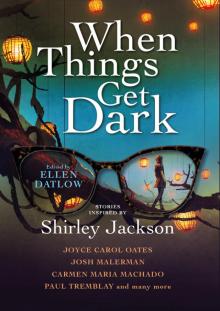 When Things Get Dark
When Things Get Dark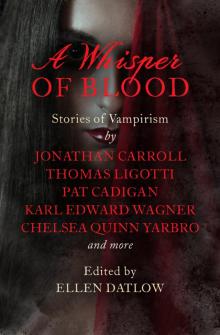 A Whisper of Blood
A Whisper of Blood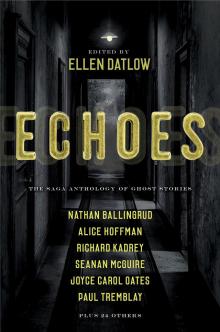 Echoes
Echoes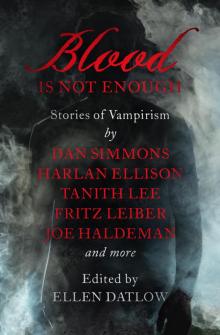 Blood Is Not Enough
Blood Is Not Enough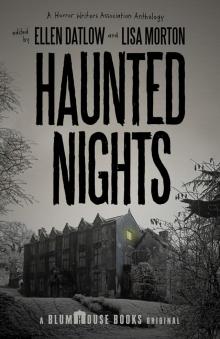 Haunted Nights
Haunted Nights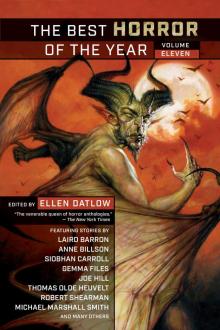 The Best Horror of the Year Volume Eleven
The Best Horror of the Year Volume Eleven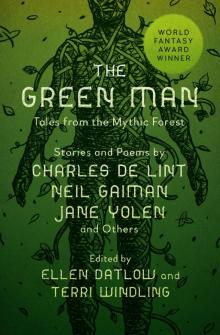 The Green Man
The Green Man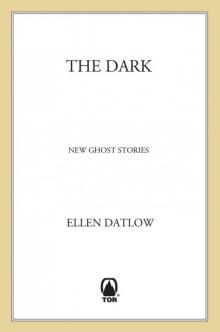 The Dark
The Dark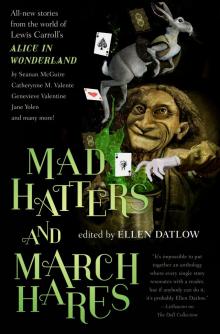 Mad Hatters and March Hares
Mad Hatters and March Hares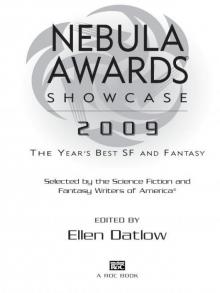 Nebula Awards Showcase 2009
Nebula Awards Showcase 2009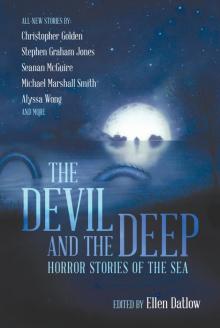 The Devil and the Deep
The Devil and the Deep